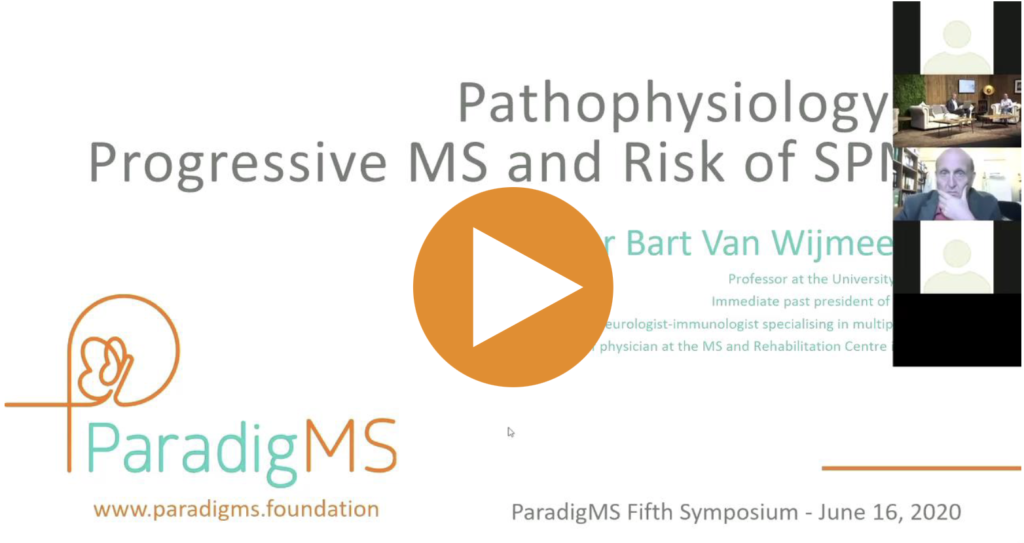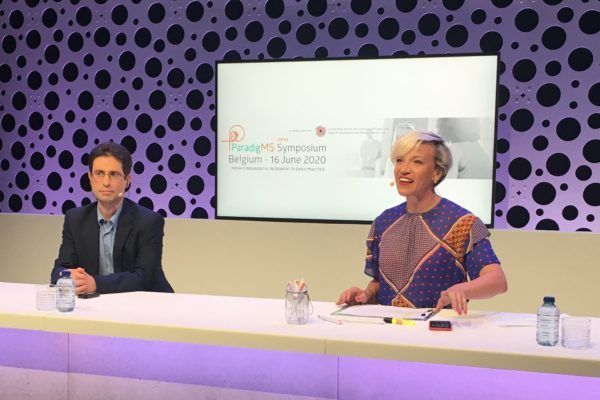Progressive Forms of Multiple Sclerosis: current knowledge on pathogenesis and current and future treatment options
16th of June 2020, Fifth ParadigMS Symposium. The ParadigMS Foundation and the Belgian Study Group for Multiple Sclerosis (BSGMS) organised for the first time an interactive and fully digital learning experience. Here you can review the full webinar on Progressive Forms of Multiple Sclerosis.
Abstracts :
CARLO POZZILLI & BART VAN WIJMEERSCH
Multiple Sclerosis (MS) is a chronic inflammatory demyelinating disease of the central nervous system (CNS) and causes neurological impairment and disability. Progressive MS (PMS) is characterized by a continuous clinical deterioration without recovery. Patients who initially present with PMS are
termed primary progressive (PPMS), while those who evolve to PMS after initially presenting with RRMS are termed secondary progressive (SPMS). Active patients experience superimposed inflammatory episodes (occurrence of clinical relapses at least once annually and/or enlarged, new or contrast enhancing T2 lesions). Non-active patients do not have clinical relapses and MRI activity (e.g., gadolinium enhancing MRI lesions, new or enlarging T2 lesions) since 1 year.
Our knowledge of PMS has increased significantly in the last few decades. A key discovery was that the pathophysiological hallmark of progression is ongoing intrathecal inflammation, behind a closed blood–brain barrier, leading to the continuing metabolic failure of neurons and axons. This finding has led to several clinical trials and research programmes that evaluate the use of disease-modifying treatments (DMTs) in the progressive forms of MS. Although there is no difference between secondary and primary progressive MS pathologically, a relapsing phase of the disease precedes SPMS clinically, and therefore the development of SPMS may be amenable to prevention. The risk of SPMS has been studied widely and is
often very closely related to the bad prognostic factors of MS.
The risk of SPMS increases with age, duration of illness and worsening disability, and decreases with improving disability. Bad prognostic signs on clinical, imaging, functional and biological grounds have been associated clearly with increased disability over time, and with the risk of SPMS.
Furthermore, DMTs may delay the onset of secondary progression. Although there are multiple approved drugs for the treatment of RRMS, current treatments have limited therapeutic benefit in PMS patients, especially the non-active population. In active PPMS patients, Ocrelizumab can be prescribed. Ocrevus is a humanized monoclonal antibody that selectively depletes CD20-expressing B cells.The initial 600 mg dose is administered as two separate intravenous infusions; first as a 300 mg infusion, followed2 weeks later by a second 300 mg infusion. Subsequent infusions are administered as a single 600 mg intravenous infusion every 6 months Siponimod is indicated for SPMS. Siponimod is a sphingosine 1-phosphate receptor (S1P) modulator which selectively binds the S1P1 and prevents lymphocytes from entering the lymph nodes and the central nervous system (CNS). The approval, was based on results of the EXPAND study, a randomised, double-blind, placebo-controlled trial which compared the safety and efficacy of Siponimod to a placebo.
Considering the lack of other treatment options, PMS patients are prescribed DMT agents off-label as well as symptomatic treatments (e.g., fampridine) to improve their quality of life.





